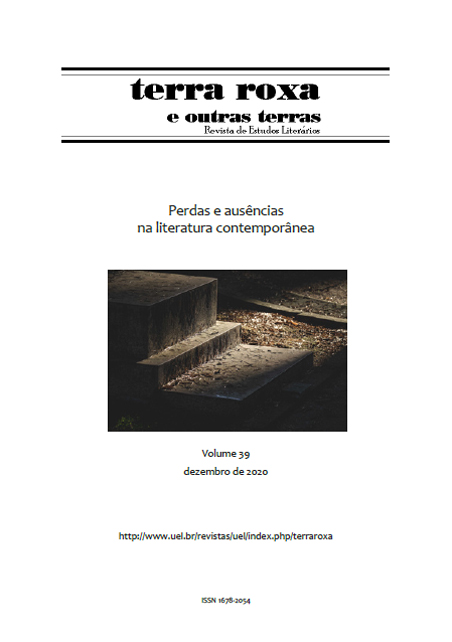The anti-elegy or the loss of meaning of the future
DOI:
https://doi.org/10.5433/1678-2054.2020v39p71Keywords:
Anti-elegy, Modern elegy, Death, Mourning, GuiltAbstract
Discussion of the qualities of modern elegy or anti-elegy, as a melancholic attitude permeating literary and artistic genres. Following the lesson of Jahan Ramazani (1994), I point to the resistance to consolation as the main quality of modern elegy in order to deal with the incomprehensible number of unfortunate mishaps in modernity. The anti-elegy is tainted with the impossibility of preserving separately an untouched space, ideally as the pastoral bucolic world, due to the speed and pressure of modern life; the suppression of mourning is also not sought, that of a healthy transition from the bond with the deceased to the bond with others who are still alive, as the space for mourning also serves as a locus of irony and derision, due to the excess of its mediatic presentation. Finally, I understand that our era of catastrophe finds its expression in anti-elegy as pornography of announced mourning, as we increasingly want to move away from future mourning, despite its inexorability.Downloads
References
CORRÊA, Alamir A. A mesa posta: elegia enquanto gênero. Calíope, Rio de Janeiro, v. 24, p. 9-30, 2012.
CORRÊA, Alamir A. Lamentos, queixas, choros, mortes e perdas: os gêneros elegíacos. Emanoel Cesar Pires de Assis; Solange Santana Guimarães Morais, orgs. A pesquisa em Letras. São Luís: EDUEMA, 2017. 15-38.
FUZA, Patrícia Josiane Tavares da Cunha. A esperança em tempos sombrios : a produção poética brasileira da primeira metade do século XX. Tese de doutoramento (PPG em Letras), Universidade Estadual de Londrina. Londrina: 2014. http://www.bibliotecadigital.uel.br/document/?code=vtls000193770.
LAGE, Rui Carlos Morais. A elegia portuguesa nos séculos XX e XXI: Perda, luto e desengano. Tese de Doutoramento (Doutorado em Literaturas e Culturas Românicas), Faculdade de Letras da Universidade do Porto. Porto: 2010. https://repositorio-aberto.up.pt/bitstream/10216/50420/2/tesedoutruilage000112866.pdf
MOURA, Murilo Marcondes de. "Três poetas brasileiros e a segunda guerra mundial - Carlos Drummond de Andrade, Cecília Meireles e Murilo Mendes". Tese de Doutoramento (PPG em Teoria Literária e Literatura Comparada), Universidade de São Paulo. São Paulo: 1998.
PFAU, Thomas. Mourning Modernity: Classical Antiquity, Romantic Theory, and Elegiac Form. Karen Weisman, org. The Oxford Handbook of The Elegy. New York: Oxford UP, 2010. 546-564.
RAE, Patricia. Mourning and Modernism. Lewisburg: Bucknell UP, 2007.
RAMAZANI, Jahan. Poetry of Mourning: The Modern Elegy from Hardy to Heany. Chicago: U of Chicago P, 1994.
RAMAZANI, Jahan. Elegy and Anti-Elegy in Stevens' "Harmonium": Mockery, Melancholia, and the Pathetic Fallacy. Journal of Modern Literature, Bloomington, v. 17, n. 4 p. 567-582, Spring, 1991. https://www.jstor.org/stable/3831364.
RICOEUR, Paul. De l'Interprétation: essai sur Freud. Paris: Seuil, 1965.
SACKS, Peter. The English Elegy. Baltimore: Johns Hopkins UP, 1985.
SHAW, W. David. Elegy and Paradox: Testing the Conventions. Baltimore: Johns Hopkins UP, 1994.
SPARGO, R. Clifton. The Contemporary Antiâ€Elegy. Karen Weisman, org. The Oxford Handbook of The Elegy. New York: Oxford UP, 2010. 213-230.
VICKERY, John B. The Modern Elegiac Temper. Baton Rouge: Lousiana State UP, 2006.
Downloads
Published
How to Cite
Issue
Section
License
Copyright (c) 2020 Terra Roxa e Outras Terras: Revista de Estudos Literários

This work is licensed under a Creative Commons Attribution 4.0 International License.
Authors who publish in this journal agree to the following terms:
a) The authors retain the copyright and grant the journal the right of first publication, the work being simultaneously licensed under the Creative Commons Attribution-NonCommercial 4.0 International License, allowing the sharing of the work with acknowledgment of the authorship of the work and initial publication in this journal.
b) Authors are authorized to assume additional contracts separately, for non-exclusive distribution of the version of the work published in this journal (eg, publish in an institutional repository or as a book chapter), with acknowledgment of authorship and initial publication in this journal.
c) Authors are allowed and encouraged to publish and distribute their work online (e.g. in institutional repositories or on their personal page) after the editorial process, as this can generate productive changes as well as increase impact and citation of the published work (See The Effect of Open Access).
d) The authors of the approved works authorize the journal to, after publication, transfer their content for reproduction in content indexers, virtual libraries and the like.
e) The authors assume that the texts submitted for publication are of their original creation, taking full responsibility for their content in case of any objection by third parties.




















